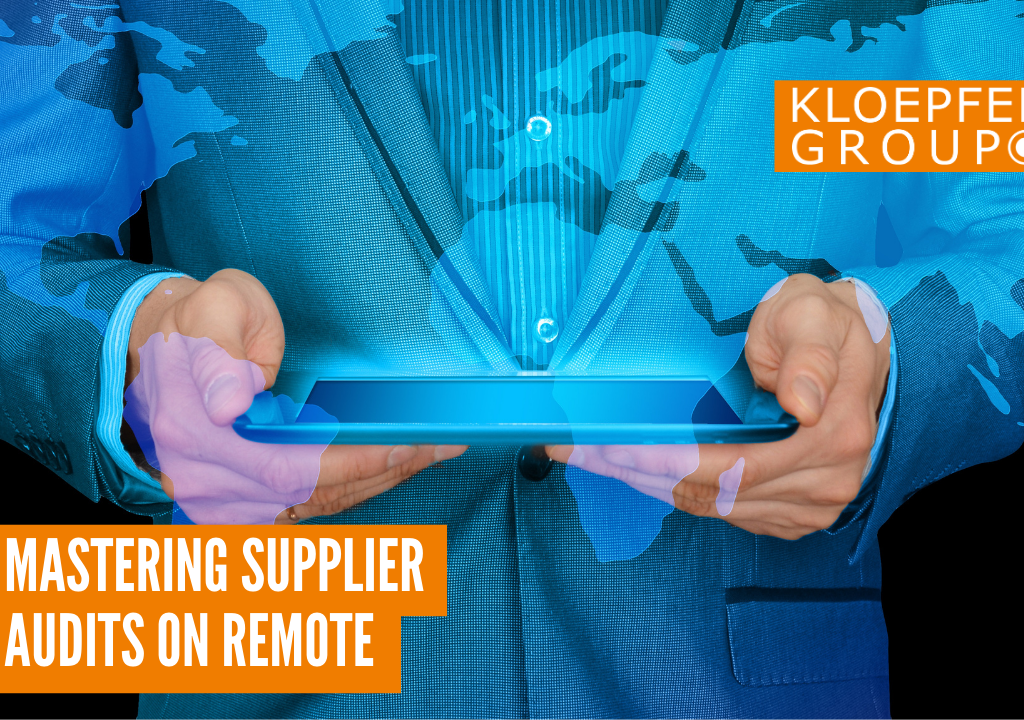Mastering supplier audits on remote
Visiting key suppliers on site should be a matter of course: Be it initially to select the right partner, for regular quality control or capacity checks prior to a new major order. In addition, many industries are currently showing how important good supplier relationships are for their own security of supply. Travel is only possible to a limited extent. So what can be done? Kloepfel Senior Partner Thomas Wandler reveals how the audit can be carried out on remote.
Mr. Wandler, what are the occasions for supplier audits?
During qualification and/or approval of a new supplier, it is often necessary and sensible to put this supplier to the test in advance by means of an audit. If there are ongoing or repeated disruptions in the supply chain, an audit can quickly reveal the actual causes – so that corrective measures can be defined directly and jointly. It may also be necessary to visit your most important suppliers regularly with an audit team because of your own certification or because of customer requirements. Finally, one of the most important reasons for me: my own risk management. This means that I should definitely audit my key suppliers. It should be noted that not every supplier visit is automatically an audit and that prices or similar things should not be discussed in the course of an audit.
How does such an audit usually proceed?
There are different procedures, but I prefer the “standardized” version. The standards describe exactly how an audit should proceed. For me, it is important to involve the supplier as a partner in the planning and to define in advance whether it is a process audit or a product audit. The time frame should also be described by means of a well-prepared agenda. If it is also possible to send the questions (at least in outline) to the supplier in advance, then the audit will go even better. Because then the auditor can really concentrate on the individual points and work through deviations directly.
Do you see that your customers are currently having difficulties with this?
Absolutely, because up to now an audit has only ever been carried out together on site. There are a lot of disruptions in the supply chain that are currently very difficult to assess, and a lot of misunderstandings arise from that.
What are the reasons for these difficulties?
Unfortunately, often the lack of preparation and the strategic direction of an audit are also not clean and disagreements can arise on both sides. Due to the current difficult travel regulations, problems can certainly arise.
How can these difficulties be addressed?
One attractive option is to delegate an audit to someone who is already on site. With our globally distributed locations and additional companies in the Kloepfel network, there is a good chance that we already have experts on site who do not have to be flown in first, which is expensive and time-consuming. Be it in China, Russia or Mexico.
But whether you are on site yourself or a representative: Good communication in advance is important! Questions must be clarified, such as: What goal am I pursuing with the audit? Why now of all times? What do I want to see, production, administration, documents …? And who will be part of the team? Based on a concrete agenda, it may also be possible to divide up the team. Of course, it is also important that the auditors are well trained – audit comes from audio and that means listening! Listening is therefore the priority.
If you do not want to hire a substitute on site despite travel difficulties, you can also respond digitally. We have already conducted audits in which the supplier “took” an employee through the company with the mobile camera switched on. In private, we are familiar with many forms of “GoPro” cameras – these are inexpensive to obtain and attach to a helmet. The employee is connected to the auditor via headphones and is thus “directed”. Of course, this does not replace a personal visit to a supplier, but this can take place at longer intervals.
What is the procedure for commissioning an audit?
Very often we come to the question of the cause during problem solving. If this cannot be found within the own company, a process audit is a useful support. If the problem is known and documented, the audit can be commissioned very quickly.
How quickly can the audit then be carried out?
If it must be done quickly, an audit can be carried out within 24 hours. However, I would like to point out that it is easier to plan and carry out an audit with a week’s lead time. It is also important to have all relevant contact persons at the supplier’s disposal.
Is it worth delegating audits even without the difficulties mentioned?
Definitely, because this often removes a lot of emotion and “old burdens” from the topic. There are also no distractions from “side shows”, as the external auditor is focused on the topic and does not know or will not deal with other topics. In addition, anyone who has tried out the option of saving a visit by deputizing directly on site in the current situation will probably not want to miss this procedure again afterwards – after all, you still get a clean audit even though travel costs and time are not incurred.
Mr. Wandler, thank you for the interview!
Press Contact
Kloepfel Consulting
Gerrit M. Schneider
Pempelforter Str. 50
40211 Duesseldorf
T: +49 211 / 882 594 17
gm.schneider@kloepfel-group.com
www.kloepfel-group.com


